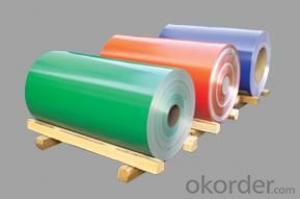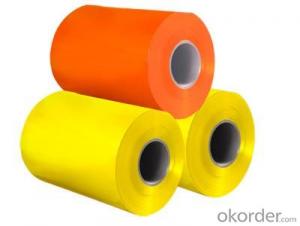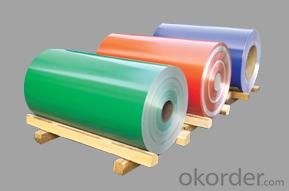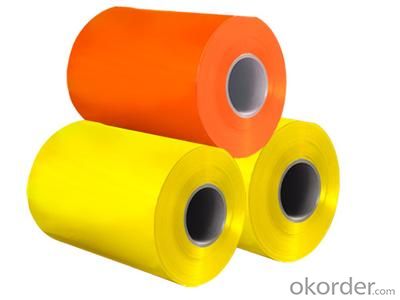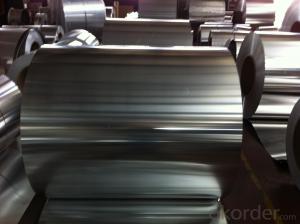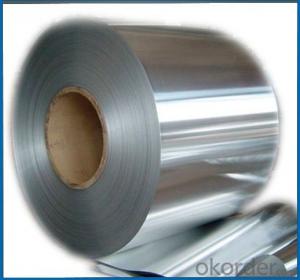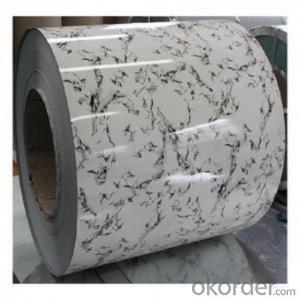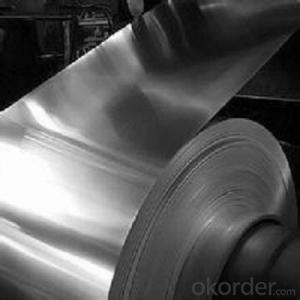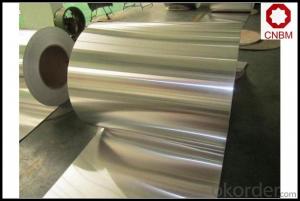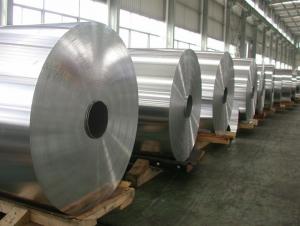Aluminum Coil Anodizers Corp Aluminum Roll, Coil to Export to Mexico
- Loading Port:
- China Main Port
- Payment Terms:
- TT OR LC
- Min Order Qty:
- -
- Supply Capability:
- -
OKorder Service Pledge
OKorder Financial Service
You Might Also Like
Aluminium is a relatively soft,durable, lightweight, ductile and malleablemetalwith appearance ranging from silvery to dull gray, depending on the surfaceroughness. It is nonmagnetic and does not easily ignite. A fresh film ofaluminium serves as a good reflector (approximately 92%) of visible light and an excellent reflector (asmuch as 98%) of medium and far infrared radiation. The yield strengthof pure aluminium is 7–11 MPa, while aluminium alloys have yield strengths ranging from200 MPa to 600 MPa. Aluminium has about one-third the density and stiffness of steel.It is easily machined, cast, drawn and extruded.
Aluminium alloys (or aluminum alloys; see spellingdifferences) are alloysin which aluminium(Al) is the predominant metal. The typical alloying elements are copper, magnesium,manganese,silicon,tin and zinc. There are twoprincipal classifications, namely casting alloys and wrought alloys, both of which are furthersubdivided into the categories heat-treatableand non-heat-treatable. About 85% of aluminium is used for wrought products,for example rolled plate, foils and extrusions.Cast aluminium alloys yield cost-effective products due to the low meltingpoint, although they generally have lower tensile strengthsthan wrought alloys. The most important cast aluminium alloy system is Al–Si,where the high levels of silicon (4.0–13%) contribute to give good castingcharacteristics. Aluminium alloys are widely used in engineering structures andcomponents where light weight or corrosion resistance is required
Alloy: AA1050, 1060, 1100, AA3003, 3005, 3015, 5052, 5754, 5083,8011,etc
Temper:H14/16/18/22/24/32,HO etc.
Thickness:0.2mm—100mm
Width:100mm—2300mm (Can be slitted)
InnerDiameter: 508MM
CoilWeight:500kg-3000kg(Max.)
Application: Foil stock, Circles, Roofing, Canstock, Marine plate,Anti-sliperypurpose in vehicles, packing and appliance.
Features:
1. Excellent quality of products
2. Quick delivery
3. Best service to clients
4. BV,SGS avalible
5. No buckle o waveness
6. Tension leveling
7. Certificate of Origin
8. Form A,E
Packaging Detail: Carton ,Wooden pallet with plastic protection packing,standard seaworthy packing or as your request.
ProductionCapacity:
AnnualProduction capacity of 600,000 tons.
Products areexported to United States, Canada, U.A.E, Brazil, Mexico,Thailand, Vietnam,Nigeria etc, over 100 countries andregions all over the world.
Coveredfactories with full production line
CNBM aluminumproduction base is comprised of 18 aluminumannealers, 10 coil and foilmills, 4 continuous production lines, 2hot rolling production line and 3prepainted lines.
FAQ:
1. What is the form of payment?
Normally 30% TT, L/C
2. Type of quotation?
FOB, CFR, CIF
3. Port of loading?
Shanghai port
4. Delivery time?
30 day after client’s deposit
- Q: Are aluminum coils suitable for architectural applications?
- Yes, aluminum coils are commonly used in architectural applications due to their durability, lightweight nature, corrosion resistance, and versatility in design options. They are often used in roofing, siding, facades, and other architectural elements, offering a long-lasting and aesthetically pleasing solution.
- Q: hello, i have been recently studying the production of aluminum from aluminum dross (recycling of aluminum) .this chemical equations represents the hydrolization of sodium aluminate to obtain aluminum hydroxide :Na2Al2O4 + 4H2O -----------gt; 2Al(OH)3 + 2NaOHafter that the next step is to produce Al2O3the next step to obtain Aluminum is to pass a current through the solution (electrolysis)this is the part that i don't get .... how could we electrolyze Aluminium oxide to produce aluminum if we are recycling aluminum ... i mean electrolysis consumes most of the energy and is very expensive .... so how do electrolysis be used in the recycling industry...please answer ... all answers are really appreciated ....and correct me if my informations are wrong...
- OMG Zilla...you're a TC!!! i might somewhat not think of roughly God or the rest seeing via aluminum foil. It makes me experience bare. I positioned on it each and every of the time. undergo thinks that's attractive. :)
- Q: Can aluminum coils be used in automotive radiators?
- Yes, aluminum coils can be used in automotive radiators. In fact, aluminum is one of the most common materials used in radiator construction due to its excellent heat transfer properties and lightweight nature. Aluminum coils are able to efficiently dissipate heat, making them a popular choice for automotive applications. Additionally, aluminum is resistant to corrosion, which is crucial for a component that comes into contact with coolant. The use of aluminum coils in automotive radiators helps improve the overall efficiency and performance of the cooling system while reducing the weight of the radiator, ultimately contributing to better fuel economy and overall vehicle performance.
- Q: What are the different types of end conditions for aluminum coils?
- The different types of end conditions for aluminum coils include plain end, slit end, trimmed end, and sheared end.
- Q: Can aluminum coils be used in marine applications?
- Yes, aluminum coils can be used in marine applications. Aluminum is a popular choice for marine applications due to its excellent corrosion resistance, lightweight nature, and high strength-to-weight ratio. It is commonly used in the construction of boats, ships, and other marine structures. Aluminum coils are particularly useful in marine applications as they can be easily formed into various shapes and sizes, making them suitable for different parts and components in the marine industry. Additionally, aluminum coils can withstand harsh marine environments and are highly resistant to saltwater corrosion, which is a significant concern in marine applications. Overall, the use of aluminum coils in marine applications is a reliable and effective choice.
- Q: A piece of aluminum foil 0.550 mm thick and 1.00 cm square is allowed to react with bromine to form aluminum bromide?a) How many mole of aluminum were used? ( The density of aluminum is 2.699 g/cm3.)I keep getting the same answer which I know is wrong. I used a formula to get the volume and then the mass to get the moles, but maybe this is wrong. Could someone explain the process. I got 4.32 x 10-1 mol Al, but the answer is 5.50 x 10-3 mol Al.
- 0.550mm = 0.055cm 0.055 x 1 x 1 = 0.055cc x 2.699g/cc = 0.1484g Al. Mol.mass = 27 g/mole 0.1484 ÷ 27 = 0.0055 moles. (5.5 x10-?)
- Q: How do aluminum coils compare to steel coils in terms of strength?
- Significant differences can be observed between aluminum coils and steel coils in terms of strength. Generally speaking, steel coils exhibit greater strength and durability when compared to their aluminum counterparts. This can be attributed to steel's renowned high tensile strength and ability to withstand heavy loads, making it the favored selection for applications that prioritize strength and durability. Conversely, aluminum coils possess a lower strength in comparison to steel. Aluminum, as a lightweight metal, exhibits a lower tensile strength, implying that it may not offer the same resistance to heavy loads or stress as steel coils. Nonetheless, aluminum coils boast other advantageous properties, including exceptional corrosion resistance and high thermal conductivity. The decision to opt for either aluminum or steel coils relies on the specific application and its requirements. If strength and durability take precedence, steel coils are generally the superior choice. However, if weight reduction, corrosion resistance, or thermal conductivity are of greater importance, aluminum coils may be the preferred option.
- Q: This question asks about the impact of aluminum coils on the quality of welding. It seeks to understand the relationship between the material properties of aluminum coils and the outcomes of the welding process.
- <p>Aluminum coils can significantly affect welding quality due to their unique properties. Aluminum has a high thermal conductivity, which requires more energy to weld, and can lead to rapid heat dissipation, affecting the weld's uniformity. Oxides on the aluminum surface can also interfere with the welding process, causing porosity and poor joint strength if not properly cleaned. Additionally, aluminum's low melting point can lead to distortion and warping if not managed correctly. The use of appropriate filler materials, proper cleaning, and precise control of welding parameters are crucial to achieve high-quality welds with aluminum coils.</p>
- Q: What are the common international standards and certifications for aluminum coils?
- There are several common international standards and certifications for aluminum coils that ensure their quality and compliance with industry requirements. These standards and certifications include: 1. International Organization for Standardization (ISO): ISO 9001 is a globally recognized standard for quality management systems. It ensures that the manufacturer has implemented effective quality control processes throughout their production and supply chain, resulting in consistent and reliable aluminum coils. 2. American Society for Testing and Materials (ASTM): ASTM International develops and publishes technical standards for various materials, including aluminum coils. ASTM B209 is a commonly referenced standard for aluminum and aluminum-alloy sheet and plate, which covers the general requirements for flat-rolled aluminum products. 3. European Norms (EN): EN 485 is a European standard that specifies the mechanical properties, dimensions, and tolerances of aluminum and aluminum alloys. It ensures that the aluminum coils manufactured in Europe comply with the specified quality and performance requirements. 4. Japan Industrial Standards (JIS): JIS H 4000 is a set of standards developed by the Japanese Industrial Standards Committee for aluminum and aluminum alloys. It covers the chemical composition, mechanical properties, and dimensions of aluminum coils, ensuring their suitability for various applications. 5. Aluminium Stewardship Initiative (ASI) Certification: ASI is a global, multi-stakeholder initiative that promotes responsible production, sourcing, and stewardship of aluminum. The ASI Certification ensures that aluminum coil manufacturers follow strict environmental, social, and governance standards, including responsible sourcing of raw materials and sustainable production practices. 6. United States Aluminum Association Certification: The Aluminum Association is a trade association in the United States that represents the aluminum industry. Their certification programs, such as the Aluminum Transportation Group (ATG) Certification, ensure that aluminum coils meet the industry's specific requirements for automotive, aerospace, and other transportation applications. These standards and certifications provide assurance to customers that the aluminum coils they are purchasing meet the necessary quality, performance, and sustainability standards. It is important for manufacturers and suppliers to adhere to these international standards to gain credibility and maintain the trust of their customers in the global market.
- Q: what is the most likely charge for aluminum cation?the answer is +3, but why? how can i figure this out with different ones?
- This Site Might Help You. RE: what is the most likely charge for aluminum cation? what is the most likely charge for aluminum cation? the answer is +3, but why? how can i figure this out with different ones?
Send your message to us
Aluminum Coil Anodizers Corp Aluminum Roll, Coil to Export to Mexico
- Loading Port:
- China Main Port
- Payment Terms:
- TT OR LC
- Min Order Qty:
- -
- Supply Capability:
- -
OKorder Service Pledge
OKorder Financial Service
Similar products
Hot products
Hot Searches
Related keywords
